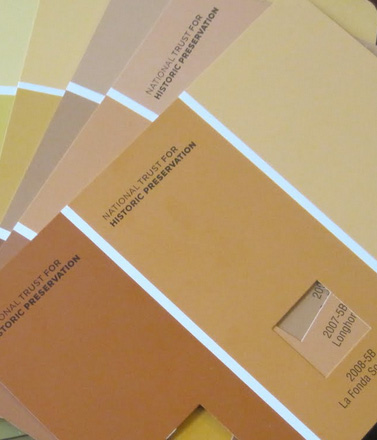 Whether you love the home you live in or are planning on selling your home in the next few years, exterior paint plays a huge role in the overall look of your home. In a home for sale, it can mean a difference in price and how many offers you receive, too.
Whether you love the home you live in or are planning on selling your home in the next few years, exterior paint plays a huge role in the overall look of your home. In a home for sale, it can mean a difference in price and how many offers you receive, too.
Obviously when selling a home, the goal is to take more conservative approach with overall color, although trim and accents can be a little more daring. When considering your paint choices, it’s wise to view the neighborhood “palette” as a whole rather than starting with paint chips in a home improvement store. Your house should be distinct yet complimentary.
With that said, it’s incredibly difficult to visualize an entire house color, trim included, with just a square of paint on a strip of paper. Oftentimes homeowners find the most long-lasting happiness in their color choice when they find a home painted the color they like and find out (by asking) the actual name of that color.
Another common method for visualizing your home in a new color is to take a digital photo of the home’s front and back exterior and upload it to one of the many paint websites available on the internet. Choose a home with similar structure and trim to yours and use the “paint feature” to experiment different looks.
Once you’ve found a paint scheme you like, buy some sample paint and apply it to various areas of your home exterior and view throughout the day to see how it looks in different light. If after a few days, you determine that the color is perfect, hire recommended professional painters (call me if you need a suggestion) and start the process of beautifying your home!
More Interesting Exterior Paint Facts to Consider When Selling Your Home:
- White (and varying shades of white) is THE most popular exterior color of homes. Other popular choices are grays and earth tones with white trim.
- Exterior paint can be used to attract attention to your home’s architecture or natural tones can actually allow it to blend with your landscaping, so determine what "look" you want to achieve before settling on colors.
- Paint colors have had huge variances in color over the years and if you own a historic home, whether colonial or designed by a specific architect, it is helpful to reference the original color when making restorations. You can consult the National Trust for Historical Preservation for information on specific genres.
- Nowadays, doors are used as an accent feature in many homes, so may want it to be an area you consider in your overall scheme, as well. Often doors are a different color from the house and trim.
- According to Homewyse.com, the 2012 national cost to paint your home averages from $1.08 to $1.43 per square foot, and you can visit their website for a tool on local estimates for your area. The forecasted cost includes preparation, painting, general debris cleanup, final touches, and any tools or supplies needed on the job. You should also plan on an added cost of about 15% to cover contractor project management, as well.

